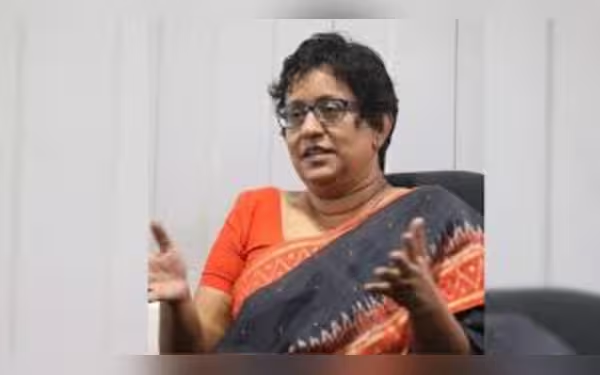Saturday, November 16, 2024 07:24 PM
Harini Amarasuriya Becomes Sri Lanka's First Female Prime Minister in 24 Years
- Harini Amarasuriya appointed as first female prime minister.
- Anura Kumara Dissanayake elected as new president.
- Sri Lanka faces severe economic challenges ahead.
 Image Credits: thefrontierpost
Image Credits: thefrontierpostHarini Amarasuriya is appointed as Sri Lanka's first female prime minister, marking a significant political shift amid economic challenges.
Sri Lanka has made a significant leap forward in its political landscape with the appointment of Harini Amarasuriya as the country's first female prime minister in 24 years. This historic event comes after the election of Anura Kumara Dissanayake as the new president, who took office on Tuesday. Amarasuriya, a 54-year-old university lecturer and activist, is a member of the Marxist-leaning National People’s Power coalition, sharing a similar political background with Dissanayake.
The election results, which saw Dissanayake triumph over former President Ranil Wickremesinghe and opposition leader Sajith Premadasa, reflect a clear rejection by the Sri Lankan populace of the old political guard. Many citizens hold these leaders accountable for the severe economic crisis that has gripped the nation. The last woman to serve as prime minister was Sirimavo Bandaranaike, who made history as the world’s first female head of government in 1960 and held the position until 2000.
As Amarasuriya steps into her new role, she faces the daunting task of addressing the economic challenges that have plagued Sri Lanka. Dissanayake's first major challenge will be to fulfill his campaign promise to alleviate the harsh austerity measures imposed by Wickremesinghe, which were part of a relief agreement with the International Monetary Fund (IMF) following Sri Lanka's debt default. Wickremesinghe has cautioned that any changes to the bailout agreement could jeopardize the release of a crucial fourth tranche of nearly $3 billion.
The roots of Sri Lanka's current crisis can be traced back to a combination of poor economic management and the repercussions of the COVID-19 pandemic, which severely impacted the tourism sector, a vital part of the country's economy. Since the introduction of universal suffrage in 1931, Sri Lankan politics has been predominantly male-dominated, a trend that is mirrored in many countries around the world. A recent analysis by the Pew Research Center revealed that in 2023, only 13 out of 193 United Nations member states had women serving as heads of government.
The appointment of Harini Amarasuriya marks a pivotal moment in Sri Lanka's political history, symbolizing a shift towards greater gender representation in leadership roles. As she embarks on this journey, the eyes of the nation will be on her to see how she navigates the complexities of governance and economic recovery. This change not only inspires hope for a more inclusive political environment but also serves as a reminder of the importance of diverse leadership in addressing the multifaceted challenges faced by nations today.













